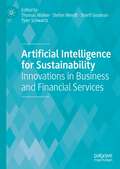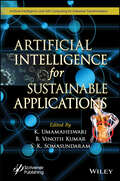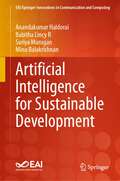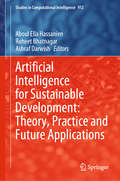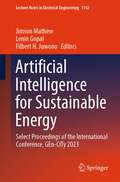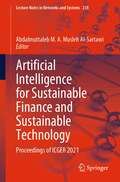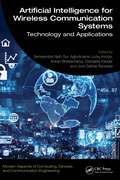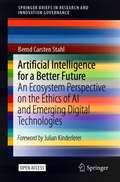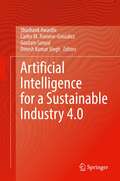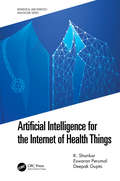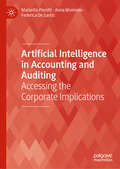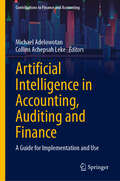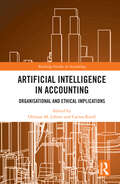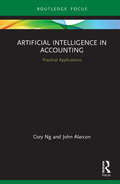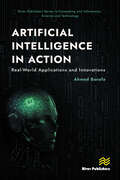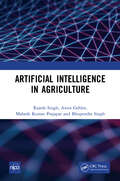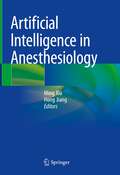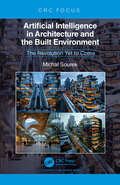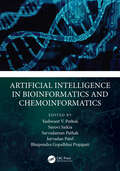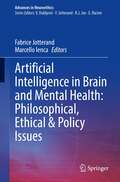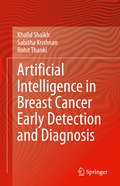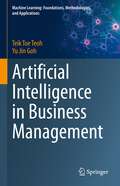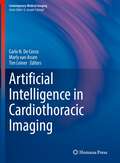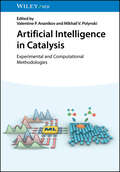- Table View
- List View
Artificial Intelligence for Sustainability: Innovations in Business and Financial Services
by Thomas Walker Sherif Goubran Stefan Wendt Tyler SchwartzIn light of the climate crisis, businesses are expected to embrace sustainability to reduce their negative impacts on the environment and society, while at the same time strengthening their organisations’ positive impacts. Managing this alongside the traditional requirements of business requires careful handling, and it is small wonder that some are heralding the advantages posed by artificial intelligence (AI) as the missing piece of the puzzle. This edited book aims to present a balanced discussion of the benefits and costs of using AI for the natural environment and society, including an analysis of its potential to help meet the UN’s Agenda 2030 and the Sustainable Development Goals. Researchers, practitioners, regulators, and entrepreneurs at the forefront of sustainable AI solutions share insights into the different sustainable applications of AI and highlight how these new developments may affect and contribute to our fight against climate change and address further environmental and social challenges. This volume will be of great interest to scholars and students of digital business and new technologies, sustainability, and strategy.
Artificial Intelligence for Sustainable Applications (Artificial Intelligence and Soft Computing for Industrial Transformation)
by B. Vinoth Kumar K. Umamaheswari S. K. SomasundaramARTIFICAL INTELLIGENCE for SUSTAINABLE APPLICATIONS The objective of this book is to leverage the significance of artificial intelligence in achieving sustainable solutions using interdisciplinary research through innovative ideas. With the advent of recent technologies, the demand for Information and Communication Technology (ICT)-based applications such as artificial intelligence (AI), machine learning (ML), Internet of Things (IoT), health care, data analytics, augmented reality/virtual reality, cyber-physical systems, and future generation networks, has increased drastically. In recent years, artificial intelligence has played a more significant role in everyday activities. While AI creates opportunities, it also presents greater challenges in the sustainable development of engineering applications. Therefore, the association between AI and sustainable applications is an essential field of research. Moreover, the applications of sustainable products have come a long way in the past few decades, driven by social and environmental awareness, and abundant modernization in the pertinent field. New research efforts are inevitable in the ongoing design of sustainable applications, which makes the study of communication between them a promising field to explore. This book highlights the recent advances in AI and its allied technologies with a special focus on sustainable applications. It covers theoretical background, a hands-on approach, and real-time use cases with experimental and analytical results. Audience AI researchers as well as engineers in information technology and computer science.
Artificial Intelligence for Sustainable Development (EAI/Springer Innovations in Communication and Computing)
by Anandakumar Haldorai Suriya Murugan Babitha Lincy R Minu BalakrishnanThis book delves into the synergy between AI and sustainability. This comprehensive guide illuminates the latest trends and cutting-edge techniques, offering invaluable insights for researchers, practitioners, and policymakers interested in the cross-section of AI and sustainability. The authors illustrate how AI-driven innovations are revolutionizing environmental conservation, urban planning, healthcare, and more. The book also considers the ethical considerations and governance frameworks crucial to harnessing AI's potential for global benefit. Whether a seasoned expert or a curious newcomer, this book empowers readers to navigate the dynamic landscape of AI and sustainability, paving the way for a more eco-conscious and equitable world.
Artificial Intelligence for Sustainable Development: Theory, Practice and Future Applications (Studies in Computational Intelligence #912)
by Ashraf Darwish Aboul Ella Hassanien Roheet BhatnagarThis book highlights the latest advances in the field of artificial intelligence and related technologies, with a special focus on sustainable development and environmentally friendly artificial intelligence applications. Discussing theory, applications and research, it covers all aspects of artificial intelligence in the context of sustainable development.
Artificial Intelligence for Sustainable Energy: Select Proceedings of the International Conference, GEn-CITy 2023 (Lecture Notes in Electrical Engineering #1142)
by Jimson Mathew Lenin Gopal Filbert H. JuwonoThis book presents select proceedings of the International Conference on Green Energy, Computing, and Intelligent Technology (GEn-CITy 2023) held at the University of Southampton Malaysia in July 2023. This book primarily covers clean energy and intelligent technologies for a sustainable future. This book serves as a forum for engineers, researchers, and specialists from academia, research centers, and industry worldwide to discuss and present the latest developments and applications related to the challenges of securing green and clean energy sources for the 21st century to protect the environment.
Artificial Intelligence for Sustainable Finance and Sustainable Technology: Proceedings of ICGER 2021 (Lecture Notes in Networks and Systems #423)
by Abdalmuttaleb M. A. Musleh Al-SartawiThis book shows latest research on artificial intelligence for sustainable technology. ICGER 2021 was organized by the Accounting, Finance and Banking Department at Ahlia University, Bahrain, and was conducted on the 15th and 16th of September. The strategic partners included the University of Jordan, the Bahrain Economists Society, the Association of Chartered Certified Accountants: ACCA, Al-Barka Banking Group and the International Computer Auditing Education Association: ICAEA . The theme of the ICGER 2021 centered around artificial intelligence for sustainable finance and sustainable technology. Accordingly, the papers presented at the conference provided a holistic view of sustainable finance, sustainability, AI, financial technology, cybersecurity, blockchain, CSR, and governance. This book, unlike ever before, brings together intelligence applications of new technologies and the sustainability requirements in the era of the digital economy, with special attention given to the opportunities, challenges, for education, business growth, and economic progression of nations which will help societies (economists, financial managers, engineers, ICT specialists, digital managers, data managers, policymakers, regulators, researchers, academics, and students) to better understand, use, and control AI applications and financial technologies to develop future strategies and to achieve sustainable development goals.
Artificial Intelligence for Wireless Communication Systems: Technology and Applications (Modern Aspects of Computing, Devices, and Communication Engineering)
by Debdatta Kandar Samarendra Nath Sur Agbotiname Lucky Imoize Jyoti Sekhar Banerjee Ankan BhattacharyaThe text provides a comprehensive study of the application of advanced artificial intelligence (AI) in next-generation wireless communications with a focus on theory, standardization, and core development. It further highlights AI-enabled intelligent architecture for sixth-generation (6G) networks to realize smart resource management, automatic network adjustment, and intelligent service layers. The book covers artificially assisted non-orthogonal multiple access schemes for 6G communication.This book: Discusses the use of AI in various aspects of wireless communications, including channel modeling, signal detection, channel coding design, and resource management Explores technical challenges in the ubiquitous fifth-generation (5G) wireless networks and the prospects of introducing artificial intelligence-based techniques in the envisioned 6G wireless networks Presents potential issues in AI-enabled approaches in wireless communications Covers AI-enabled energy efficiency optimization and cross-layer optimization in the next-generation wireless networks Explains artificially empowered security and privacy schemes in next-generation wireless networks and next-generation mobile management It is primarily written for senior undergraduates, graduate students, and academic researchers in the fields of electrical engineering, electronics and communication engineering, and computer engineering.
Artificial Intelligence for a Better Future: An Ecosystem Perspective on the Ethics of AI and Emerging Digital Technologies (SpringerBriefs in Research and Innovation Governance)
by Bernd Carsten StahlThis open access book proposes a novel approach to Artificial Intelligence (AI) ethics. AI offers many advantages: better and faster medical diagnoses, improved business processes and efficiency, and the automation of boring work. But undesirable and ethically problematic consequences are possible too: biases and discrimination, breaches of privacy and security, and societal distortions such as unemployment, economic exploitation and weakened democratic processes. There is even a prospect, ultimately, of super-intelligent machines replacing humans. The key question, then, is: how can we benefit from AI while addressing its ethical problems?This book presents an innovative answer to the question by presenting a different perspective on AI and its ethical consequences. Instead of looking at individual AI techniques, applications or ethical issues, we can understand AI as a system of ecosystems, consisting of numerous interdependent technologies, applications and stakeholders. Developing this idea, the book explores how AI ecosystems can be shaped to foster human flourishing. Drawing on rich empirical insights and detailed conceptual analysis, it suggests practical measures to ensure that AI is used to make the world a better place.
Artificial Intelligence for a Sustainable Industry 4.0
by Dinesh Kumar Singh Carlos M. Travieso-González Goutam Sanyal Shashank AwasthiThis book outlines the recent advancements in the field of artificial intelligence (AI) and addresses how useful it is in achieving truly sustainable solutions. The book also serves as a useful reference literature in developing sustainable engineering solutions to various social and techno-commercial issues of global significance. This book is organized into two sections: section 1 is focused on fundamentals and principles of AI to lay the groundwork for the second section. Section 2 explores the sustainable engineering solutions development using AI, which addresses challenges in various computing techniques and opportunities in engineering design for sustainable development using IoT/AI and smart cities. Applications include waste minimization, re-manufacturing, reuse and recycling technologies using IoT/AI, Industry 4.0, intelligent and smart grid systems, energy conservation using technology, and robotic process automation (RPA). The book is ideal for the engineers, researchers and students interested in how AI can aid in sustainable development applications.
Artificial Intelligence for the Internet of Health Things (Biomedical and Robotics Healthcare)
by Deepak Gupta K. Shankar Eswaran PerumalThis book discusses research in Artificial Intelligence for the Internet of Health Things. It investigates and explores the possible applications of machine learning, deep learning, soft computing, and evolutionary computing techniques in design, implementation, and optimization of challenging healthcare solutions. This book features a wide range of topics such as AI techniques, IoT, cloud, wearables, and secured data transmission. Written for a broad audience, this book will be useful for clinicians, health professionals, engineers, technology developers, IT consultants, researchers, and students interested in the AI-based healthcare applications. Provides a deeper understanding of key AI algorithms and their use and implementation within the wider healthcare sector Explores different disease diagnosis models using machine learning, deep learning, healthcare data analysis, including machine learning, and data mining and soft computing algorithms Discusses detailed IoT, wearables, and cloud-based disease diagnosis model for intelligent systems and healthcare Reviews different applications and challenges across the design, implementation, and management of intelligent systems and healthcare data networks Introduces a new applications and case studies across all areas of AI in healthcare data K. Shankar (Member, IEEE) is a Postdoctoral Fellow of the Department of Computer Applications, Alagappa University, Karaikudi, India. Eswaran Perumal is an Assistant Professor of the Department of Computer Applications, Alagappa University, Karaikudi, India. Dr. Deepak Gupta is an Assistant Professor of the Department Computer Science & Engineering, Maharaja Agrasen Institute of Technology (GGSIPU), Delhi, India.
Artificial Intelligence in Accounting and Auditing: Accessing the Corporate Implications
by Anna Monreale Mariarita Pierotti Federica De SantisThis book investigates the phenomenon of artificial intelligence (AI) in the accounting world. It integrates accounting competencies with specific competencies in AI and other digital technologies and offers an interdisciplinary perspective. First, the authors review and discuss the literature to summarize and systematize extant research on digitalization in accounting. Second, case studies are included to illustrate the potential impact of AI in business contexts in terms of opportunities and challenges. Based on these, the book explores how digitalization is influencing the accounting practice and what the most important avenues are for future research on digitalization in accounting, and will be of interest to researchers, students, and practitioners of financial technology, accounting, and risk management.
Artificial Intelligence in Accounting, Auditing and Finance: A Guide for Implementation and Use (Contributions to Finance and Accounting)
by Collins Achepsah Leke Michael AdelowotanThis book focuses on the use of Artificial Intelligence (AI) for accounting, auditing, and finance. It explores how AI can be leveraged to perform various tasks within these fields and offers real life examples to illustrate its features and facilitate implementation. The book further examines how different AI technologies, such as Machine Learning, Deep Learning, Natural Language Processing, and others, can be used to improve processes and functions in accounting and financial reporting. Furthermore, the authors explain the different subsets of Artificial Intelligence and how they can be used for practical purposes. The book provides a basic guide of these emerging technologies to help practitioners in the field to better understand how they can be implemented in their companies.
Artificial Intelligence in Accounting: Organisational and Ethical Implications (Routledge Studies in Accounting)
by Othmar M. Lehner Carina KnollArtificial intelligence (AI) and Big Data based applications in accounting and auditing have become pervasive in recent years. However, research on the societal implications of the widespread and partly unregulated use of AI and Big Data in several industries remains scarce despite salient and competing utopian and dystopian narratives. This book focuses on the transformation of accounting and auditing based on AI and Big Data. It not only provides a thorough and critical overview of the status-quo and the reports surrounding these technologies, but it also presents a future outlook on the ethical and normative implications concerning opportunities, risks, and limits. The book discusses topics such as future, human-machine collaboration, cybernetic approaches to decision-making, and ethical guidelines for good corporate governance of AI-based algorithms and Big Data in accounting and auditing. It clarifies the issues surrounding the digital transformation in this arena, delineates its boundaries, and highlights the essential issues and debates within and concerning this rapidly developing field. The authors develop a range of analytic approaches to the subject, both appreciative and sceptical, and synthesise new theoretical constructs that make better sense of human-machine collaborations in accounting and auditing. This book offers academics a variety of new research and theory building on digital accounting and auditing from and for accounting and auditing scholars, economists, organisations, and management academics and political and philosophical thinkers. Also, as a landmark work in a new area of current policy interest, it will engage regulators and policy makers, reflective practitioners, and media commentators through its authoritative contributions, editorial framing and discussion, and sector studies and cases.
Artificial Intelligence in Accounting: Practical Applications (ISSN)
by Cory Ng John AlarconArtificial Intelligence in Accounting: Practical Applications was written with a simple goal: to provide accountants with a foundational understanding of AI and its many business and accounting applications. It is meant to serve as a guide for identifying opportunities to implement AI initiatives to increase productivity and profitability. This book will help you answer questions about what AI is and how it is used in the accounting profession today. Offering practical guidance that you can leverage for your organization, this book provides an overview of essential AI concepts and technologies that accountants should know, such as machine learning, deep learning, and natural language processing. It also describes accounting-specific applications of robotic process automation and text mining. Illustrated with case studies and interviews with representatives from global professional services firms, this concise volume makes a significant contribution to examining the intersection of AI and the accounting profession. This innovative book also explores the challenges and ethical considerations of AI. It will be of great interest to accounting practitioners, researchers, educators, and students.
Artificial Intelligence in Accounting: Practical Applications (Routledge Focus on Business and Management)
by Cory Ng John AlarconArtificial Intelligence in Accounting: Practical Applications was written with a simple goal: to provide accountants with a foundational understanding of AI and its many business and accounting applications. It is meant to serve as a guide for identifying opportunities to implement AI initiatives to increase productivity and profitability. This book will help you answer questions about what AI is and how it is used in the accounting profession today. Offering practical guidance that you can leverage for your organization, this book provides an overview of essential AI concepts and technologies that accountants should know, such as machine learning, deep learning, and natural language processing. It also describes accounting-specific applications of robotic process automation and text mining. Illustrated with case studies and interviews with representatives from global professional services firms, this concise volume makes a significant contribution to examining the intersection of AI and the accounting profession. This innovative book also explores the challenges and ethical considerations of AI. It will be of great interest to accounting practitioners, researchers, educators, and students.
Artificial Intelligence in Action: Real-World Applications and Innovations (River Publishers Series in Computing and Information Science and Technology)
by Ahmed BanafaThis comprehensive book dives deep into the current landscape of AI, exploring its fundamental principles, development challenges, potential risks, and the cutting-edge breakthroughs that are propelling it forward. Artificial intelligence (AI) is rapidly transforming industries and societies worldwide through groundbreaking innovations and real-world applications. Starting with the core concepts, the book examines the various types of AI systems, generative AI models, and the complexities of machine learning. It delves into the programming languages driving AI development, data pipelines, model creation and deployment processes, while shedding light on issues like AI hallucinations and the intricate path of machine unlearning.The book then showcases the remarkable real-world applications of AI across diverse domains. From preventing job displacement and promoting environmental sustainability, to enhancing disaster response, drone technology, and even nuclear energy innovation, it highlights how AI is tackling complex challenges and driving positive change.The book also explores the double-edged nature of AI, recognizing its tremendous potential while cautioning about the risks of misuse, unintended consequences, and the urgent need for responsible development practices. It examines the intersection of AI and fields like operating system design, warfare, and semiconductor technology, underscoring the wide-ranging implications of this transformative force.As the quest for artificial general intelligence (AGI) and superintelligent AI systems intensifies, the book delves into cutting-edge research, emerging trends, and the pursuit of multimodal, explainable, and causally aware AI systems. It explores the symbiotic relationship between AI and human creativity, the rise of user-friendly "casual AI," and the potential of AI to tackle open-ended tasks.This is an essential guide for understanding the profound impact of AI on our world today and its potential to shape our future. From the frontiers of innovation to the challenges of responsible development, this book offers a comprehensive and insightful exploration of the remarkable real-world applications and innovations driving the AI revolution.
Artificial Intelligence in Agriculture
by Rajesh Singh Anita Gehlot Bhupendra Singh Mahesh Kumar PrajapatThis book is a platform for anyone who wishes to explore Artificial Intelligence in the field of agriculture from scratch or broaden their understanding and its uses. This book offers a practical, hands-on exploration of Artificial Intelligence, machine learning, deep Learning, computer vision and Expert system with proper examples to understand. This book also covers the basics of python with example so that any anyone can easily understand and utilize artificial intelligence in agriculture field. This book is divided into two parts wherein first part talks about the artificial intelligence and its impact in the agriculture with all its branches and their basics. The second part of the book is purely implementation of algorithms and use of different libraries of machine learning, deep learning and computer vision to build useful and sightful projects in real time which can be very useful for you to have better understanding of artificial intelligence. After reading this book, the reader will an understanding of what Artificial Intelligence is, where it is applicable, and what are its different branches, which can be useful in different scenarios. The reader will be familiar with the standard workflow for approaching and solving machine-learning problems, and how to address commonly encountered issues. The reader will be able to use Artificial Intelligence to tackle real-world problems ranging from crop health prediction to field surveillance analytics, classification to recognition of species of plants etc.Note: T&F does not sell or distribute the hardback in India, Pakistan, Nepal, Bhutan, Bangladesh and Sri Lanka. This title is co-published with NIPA.
Artificial Intelligence in Anesthesiology
by Hong Jiang Ming XiaConsidering the rapid developments in digital and information technologies, artificial intelligence has long been a hot topic in medicine. This book discusses applications of artificial intelligence in anaesthesiology, including control of anesthesia, risk prediction, ultrasound guidance, pain management, and operating room logistics. This book first defines basic concepts of AI, and give a brief overview of a few algorithms frequently used in AI and machine learning. A review of current AI and machine learning applications for the prediction of anesthesia conditions is also discussed, including those for the prediction of difficult airways before surgery, of adverse events and sedation effects during surgery, and of vomiting and pain after surgery. Even without extensive promotion and clinical application, AI is in development in anesthesiology; furthermore, it has a great deal of potential to maintain further development in the future. Lastly, ethical and safety considerations are discussed alongside AI limitations and challenges in anesthesiology.
Artificial Intelligence in Architecture and the Built Environment: The Revolution Yet to Come
by Michal SourekImagine if every architect had an apprentice who could consistently observe and understand their intentions, take over routine tasks and monitor technical, environmental, and economic constraints. This apprentice would continually improve, freeing the architect to concentrate on truly creative work.This book outlines a plan to turn this vision into reality. It evaluates the development of artificial intelligence from its inception to the present, focusing on the last two decades of applying AI in architectural design and planning; the current state of architectural practice is also examined. Integrating architecture, computer science, AI, robotics, economics, law, neurobiology, and philosophy, the vision is built on three key premises: (i) authentic, poetic creativity that transcends parameterization and algorithmizing, (ii) innovative learning strategies and training approaches not yet applied concerning architectural design, and (iii) the convergence of architecture’s inherent spatiality with virtual reality technology and new theories of human thinking and intelligence, poised for implementation in machine learning.
Artificial Intelligence in Bioinformatics and Chemoinformatics
by Yashwant V. PathakThe authors aim to shed light on the practicality of using machine learning in finding complex chemoinformatics and bioinformatics applications as well as identifiying AI in biological and chemical data points. The chapters are designed in such a way that they highlight the important role of AI in chemistry and bioinformatics particularly for the classification of diseases, selection of features and compounds, dimensionality reduction and more. In addition, they assist in the organization and optimal use of data points generated from experiments performed using AI techniques. This volume discusses the development of automated tools and techniques to aid in research plans. Features Covers AI applications in bioinformatics and chemoinformatics Demystifies the involvement of AI in generating biological and chemical data Provides an Introduction to basic and advanced chemoinformatics computational tools Presents a chemical biology based toolset for artificial intelligence usage in drug design Discusses computational methods in cancer, genome mapping, and stem cell research
Artificial Intelligence in Brain and Mental Health: Philosophical, Ethical & Policy Issues (Advances in Neuroethics)
by Fabrice Jotterand Marcello IencaThis volume provides an interdisciplinary collection of essays from leaders in various fields addressing the current and future challenges arising from the implementation of AI in brain and mental health. Artificial Intelligence (AI) has the potential to transform health care and improve biomedical research. While the potential of AI in brain and mental health is tremendous, its ethical, regulatory and social impacts have not been assessed in a comprehensive and systemic way. The volume is structured according to three main sections, each of them focusing on different types of AI technologies. Part 1, Big Data and Automated Learning: Scientific and Ethical Considerations, specifically addresses issues arising from the use of AI software, especially machine learning, in the clinical context or for therapeutic applications. Part 2, AI for Digital Mental Health and Assistive Robotics: Philosophical and Regulatory Challenges, examines philosophical, ethical and regulatory issues arising from the use of an array of technologies beyond the clinical context. In the final section of the volume, Part 3 entitled AI in Neuroscience and Neurotechnology: Ethical, Social and Policy Issues, contributions examine some of the implications of AI in neuroscience and neurotechnology and the regulatory gaps or ambiguities that could potentially hamper the responsible development and implementation of AI solutions in brain and mental health. In light of its comprehensiveness and multi-disciplinary character, this book marks an important milestone in the public understanding of the ethics of AI in brain and mental health and provides a useful resource for any future investigation in this crucial and rapidly evolving area of AI application. The book is of interest to a wide audience in neuroethics, robotics, computer science, neuroscience, psychiatry and mental health.
Artificial Intelligence in Breast Cancer Early Detection and Diagnosis
by Rohit Thanki Khalid Shaikh Sabitha KrishnanThis book provides an introduction to next generation smart screening technology for medical image analysis that combines artificial intelligence (AI) techniques with digital screening to develop innovative methods for detecting breast cancer. The authors begin with a discussion of breast cancer, its characteristics and symptoms, and the importance of early screening.They then provide insight on the role of artificial intelligence in global healthcare, screening methods for breast cancer using mammogram, ultrasound, and thermogram images, and the potential benefits of using AI-based systems for clinical screening to more accurately detect, diagnose, and treat breast cancer.Discusses various existing screening methods for breast cancerPresents deep information on artificial intelligence-based screening methods Discusses cancer treatment based on geographical differences and cultural characteristics
Artificial Intelligence in Business Management (Machine Learning: Foundations, Methodologies, and Applications)
by Teik Toe Teoh Yu Jin GohArtificial intelligence (AI) is rapidly gaining significance in the business world. With more and more organizations adopt AI technologies, there is a growing demand for business leaders, managers, and practitioners who can harness AI’s potential to improve operations, increase efficiency, and drive innovation. This book aims to help management professionals exploit the predictive powers of AI and demonstrate to AI practitioners how to apply their expertise in fundamental business operations. It showcases how AI technology innovations can enhance various aspects of business management, such as business strategy, finance, and marketing. Readers interested in AI for business management will find several topics of particular interest, including how AI can improve decision-making in business strategy, streamline operational processes, and enhance customer satisfaction. As AI becomes an increasingly important tool in the business world, this book offers valuable insights into how it can be applied to various industries and business settings. Through this book, readers will gain a better understanding of how AI can be applied to improve business management practices and practical guidance on how to implement AI projects in a business context. This book also provides practical guides on how to implement AI projects in a business context using Python programming. By reading this book, readers will be better equipped to make informed decisions about how to leverage AI for business success.
Artificial Intelligence in Cardiothoracic Imaging (Contemporary Medical Imaging)
by Carlo N. De Cecco Marly Van Assen Tim LeinerThis book provides an overview of current and potential applications of artificial intelligence (AI) for cardiothoracic imaging. Most AI systems used in medical imaging are data-driven and based on supervised machine learning. Clinicians and AI specialists can contribute to the development of an AI system in different ways, focusing on their respective strengths. Unfortunately, communication between these two sides is far from fluent and, from time to time, they speak completely different languages. Mutual understanding and collaboration are imperative because the medical system is based on physicians’ ability to take well-informed decisions and convey their reasoning to colleagues and patients.This book offers unique insights and informative chapters on the use of AI for cardiothoracic imaging from both the technical and clinical perspective. It is also a single comprehensive source that provides a complete overview of the entire process of the development and use of AI in clinical practice for cardiothoracic imaging. The book contains chapters focused on cardiac and thoracic applications as well more general topics on the potentials and pitfalls of AI in medical imaging. Separate chapters will discuss the valorization, regulations surrounding AI, cost-effectiveness, and future perspective for different countries and continents. This book is an ideal guide for clinicians (radiologists, cardiologists etc.) interested in working with AI, whether in a research setting developing new AI applications or in a clinical setting using AI algorithms in clinical practice. The book also provides clinical insights and overviews for AI specialists who want to develop clinically relevant AI applications.
Artificial Intelligence in Catalysis: Experimental and Computational Methodologies
by Valentine P. Ananikov Mikhail V. PolynskiEnables researchers and professionals to leverage machine learning tools to optimize catalyst design and chemical processes Artificial Intelligence in Catalysis delivers a state-of-the-art overview of artificial intelligence methodologies applied in catalysis. Divided into three parts, it covers the latest advancements and trends for catalyst discovery and characterization, reaction predictions, and process optimization using machine learning, quantum chemistry, and cheminformatics. Written by an international team of experts in the field, with each chapter combining experimental and computational knowledge, Artificial Intelligence in Catalysis includes information on: Artificial intelligence techniques for chemical reaction monitoring and structural analysisApplication of artificial neural networks in the analysis of electron microscopy dataConstruction of training datasets for chemical reactivity prediction through computational meansCatalyst optimization and discovery using machine learning modelsPredicting selectivity in asymmetric catalysis with machine learning Artificial Intelligence in Catalysis is a practical guide for researchers in academia and industry interested in developing new catalysts, improving organic synthesis, and minimizing waste and energy use.
